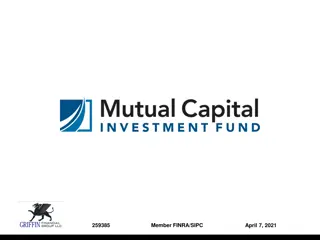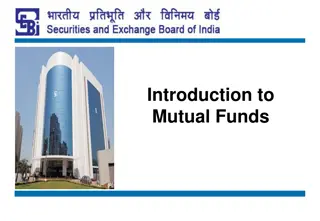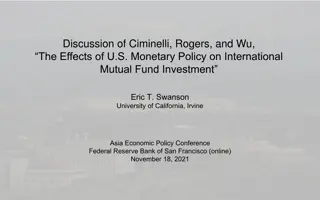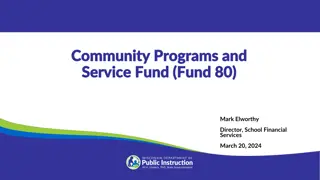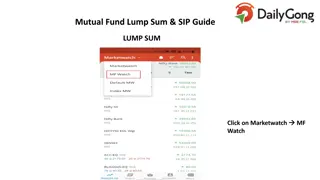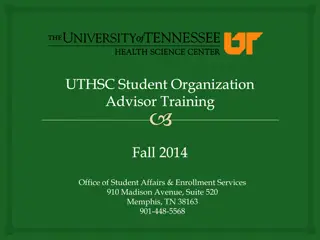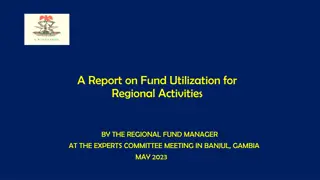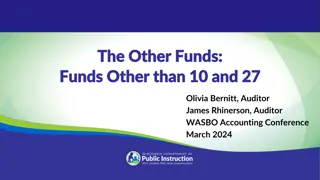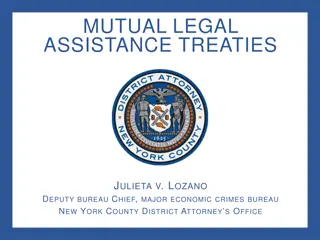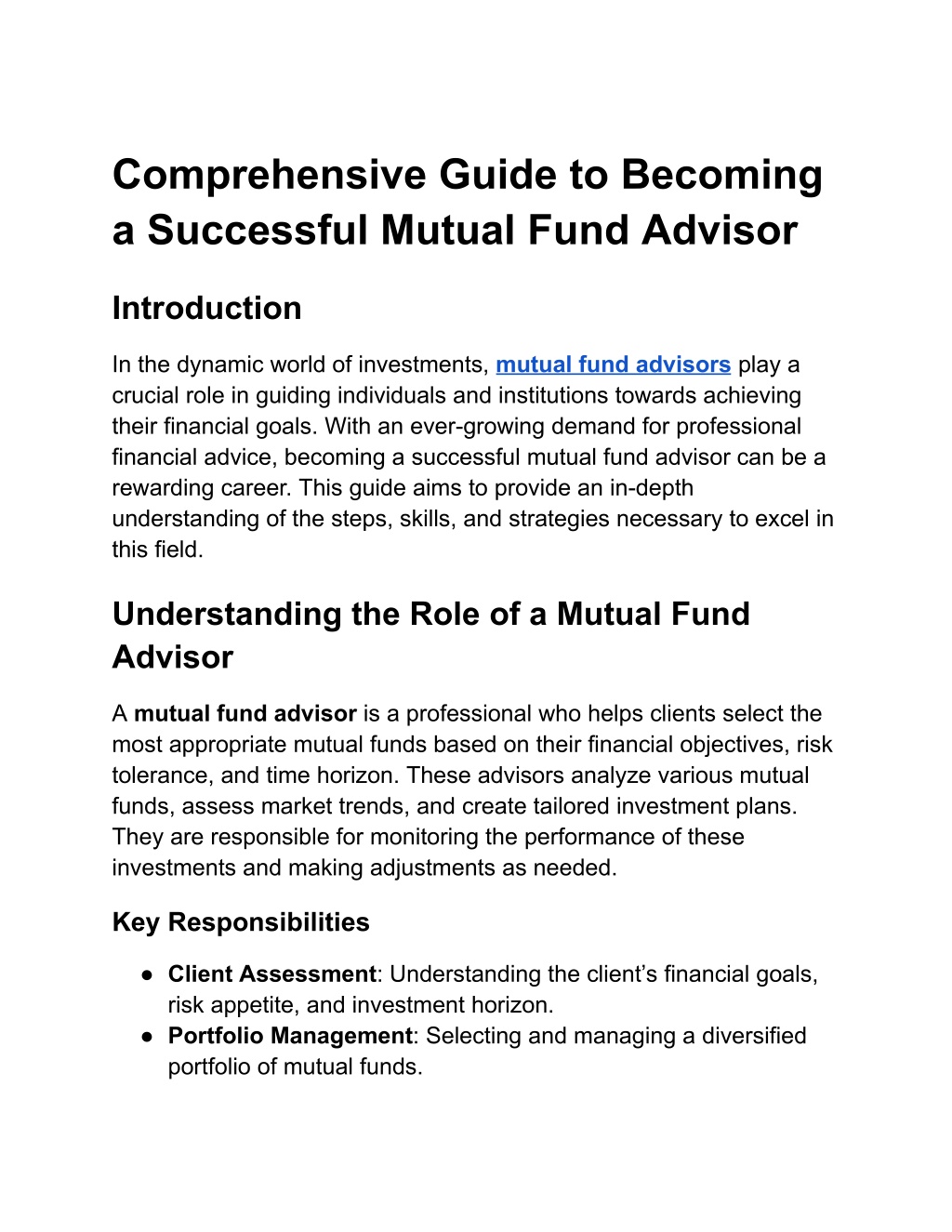
Comprehensive Guide to Becoming a Successful Mutual Fund Advisor
In the dynamic world of investments, mutual fund advisors play a crucial role in guiding individuals and institutions towards achieving their financial goals. With an ever-growing demand for professional financial advice, becoming a successful mutual fund advisor can be a rewarding career. This guide aims to provide an in-depth understanding of the steps, skills, and strategies necessary to excel in this field.
Uploaded on | 0 Views
Download Presentation

Please find below an Image/Link to download the presentation.
The content on the website is provided AS IS for your information and personal use only. It may not be sold, licensed, or shared on other websites without obtaining consent from the author. Download presentation by click this link. If you encounter any issues during the download, it is possible that the publisher has removed the file from their server.
E N D
Presentation Transcript
Comprehensive Guide to Becoming a Successful Mutual Fund Advisor Introduction In the dynamic world of investments, mutual fund advisors play a crucial role in guiding individuals and institutions towards achieving their financial goals. With an ever-growing demand for professional financial advice, becoming a successful mutual fund advisor can be a rewarding career. This guide aims to provide an in-depth understanding of the steps, skills, and strategies necessary to excel in this field. Understanding the Role of a Mutual Fund Advisor A mutual fund advisor is a professional who helps clients select the most appropriate mutual funds based on their financial objectives, risk tolerance, and time horizon. These advisors analyze various mutual funds, assess market trends, and create tailored investment plans. They are responsible for monitoring the performance of these investments and making adjustments as needed. Key Responsibilities Client Assessment: Understanding the client s financial goals, risk appetite, and investment horizon. Portfolio Management: Selecting and managing a diversified portfolio of mutual funds.
Market Analysis: Keeping abreast of market trends, economic indicators, and fund performance. Client Education: Educating clients about the benefits and risks associated with mutual fund investments. Regulatory Compliance: Ensuring all activities comply with relevant financial regulations and standards. Steps to Becoming a Mutual Fund Advisor 1. Obtain the Necessary Education A strong educational foundation is essential for a career in financial advisory. A bachelor's degree in finance, economics, accounting, or a related field is typically required. Advanced degrees, such as a Master's in Business Administration (MBA), can enhance your credibility and job prospects. 2. Gain Relevant Experience Practical experience is crucial. Many advisors start in entry-level positions at financial institutions, gaining experience in areas such as financial analysis, portfolio management, or client services. Internships during college can also provide valuable insights and industry connections. 3. Acquire Professional Certifications Certifications enhance your credibility and demonstrate your expertise. Some of the most recognized certifications include: Certified Financial Planner (CFP) Chartered Financial Analyst (CFA) Financial Risk Manager (FRM) Certified Investment Management Analyst (CIMA)
4. Register with Regulatory Bodies To legally operate as a mutual fund advisor, you must register with the appropriate regulatory bodies. In the United States, this includes passing the Series 6 or Series 7 exams administered by the Financial Industry Regulatory Authority (FINRA). 5. Develop a Deep Understanding of Mutual Funds A successful mutual fund advisor must have a thorough understanding of different types of mutual funds, such as equity funds, bond funds, index funds, and sector funds. Knowledge of fund structures, fee arrangements, and performance metrics is also essential. 6. Build Strong Analytical Skills Analytical skills are critical for evaluating fund performance, understanding market trends, and making informed investment decisions. Advisors use various tools and software to analyze data and predict market movements. 7. Hone Your Communication Skills Effective communication is key to building and maintaining client relationships. Advisors must be able to explain complex financial concepts in a clear and concise manner, ensuring clients understand their investment strategies and decisions.
Strategies for Success as a Mutual Fund Advisor 1. Establish a Client-Centered Approach Successful advisors prioritize their clients' needs and interests. Building trust and understanding the unique financial situations of each client allows for more personalized and effective investment strategies. 2. Continuous Learning and Professional Development The financial markets are constantly evolving, and staying updated with the latest trends, tools, and regulations is essential. Attend industry seminars, pursue additional certifications, and participate in continuous education programs. 3. Leverage Technology Utilize the latest financial software and analytical tools to enhance your advisory services. Technology can help streamline portfolio management, improve client communication, and provide deeper insights into market trends. 4. Network and Build Professional Relationships Networking is vital for career growth. Join professional organizations, attend industry events, and connect with other financial professionals to share knowledge and opportunities. 5. Maintain Ethical Standards
Adhering to ethical standards and maintaining integrity is crucial for building a reputable practice. Always act in the best interest of your clients and ensure transparency in all dealings. The Future of Mutual Fund Advisory The role of mutual fund advisors is evolving with advancements in technology and changing market dynamics. Robo-advisors and AI-driven analytics are reshaping the industry, offering more efficient and data-driven investment solutions. However, the personalized advice and human touch that experienced advisors provide remain invaluable. Embracing Technology Advisors who embrace technology and integrate it into their practice can offer enhanced services and stay competitive. Tools like AI-driven analytics, robo-advisors, and advanced financial planning software can augment an advisor's capabilities and provide clients with more sophisticated investment strategies. Focusing on Holistic Financial Planning Clients increasingly seek comprehensive financial planning that goes beyond mutual fund investments. Advisors who offer holistic financial planning, including retirement planning, tax optimization, and estate planning, can provide more value and build longer-lasting client relationships.
Conclusion Becoming a successful mutual fund advisor requires a combination of education, experience, and continuous professional development. By prioritizing client needs, staying informed about market trends, leveraging technology, and maintaining ethical standards, advisors can build a thriving practice and help clients achieve their financial goals.


